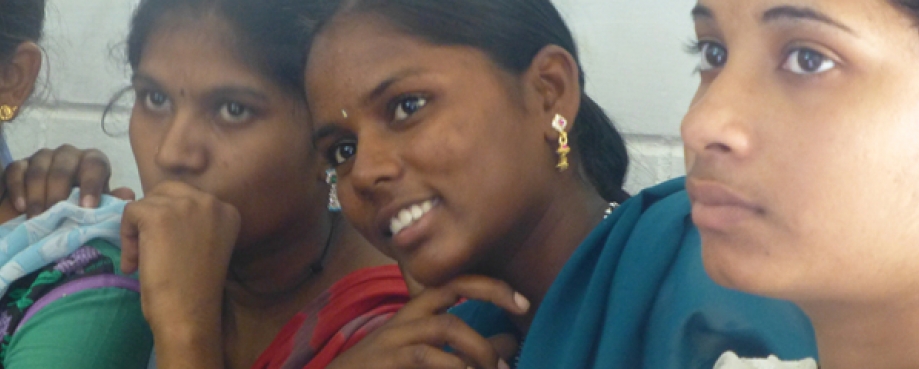
Twenty-five young women in brightly coloured salwar kameez, with fragrant strings of jasmine plaited into their hair, are seated on reed mats in a dedicated space – the Nalam or wellbeing corner – in a local spinning mill that produces thread for the world’s garment production.
Many young female mill workers are recruited from poor, rural communities with promises of well-paid apprenticeships that will teach them new skills and help them save for their dowries. Yet the reality in many mills is long hours, low pay and unhealthy workplaces and dormitories as well as deprivation of freedom. Furthermore, they come from a culture in which most women, especially younger women, are expected to stay quiet, do as they are told and accept their fate.
Workers learn about maternal and child health in the Nalam or wellbeing space
Today, as part of ETI’s Nalam Programme the workers are learning about maternal and child health and family planning. But Nalam is also building their confidence and their ability to speak up for themselves.
The three teachers, Suriya, Ramamirtham and Manimegala are just as young as their students. They are ‘peer educators’, trained by ETI’s programme partner, PSG Institute of Medical Sciences and Research. Wearing neat blue work coats and hairnets, they talk through nutrition during pregnancy and breastfeeding.
ETI’s Gayathri Jeganathan, the driving force behind Nalam asks them who it is that knows when a baby is due. “The doctor!” they all chorus. But by giving them a mathematical formula to work it out for themselves, she reminds them that knowledge about their bodies is not the sole prerogative of doctors and that they, too, have some power; a small but important boost to their self-reliance and self-respect.
In attendance is S. Hedvees Christopher, who has blogged previously on the role of recruitment agents. He is the manager of ETI's programme in Tamil Nadu, of which Nalam is one part, and gets the women laughing and shouting out answers about family planning. Their initial shyness about discussing the topic in the presence of a man is quickly dissipated by his relaxed, friendly yet matter-of-fact manner. Perhaps this too helps erode a little more the barrier to communication between them and their male managers.
At the end of the session, six of the young women say they would like to become peer educators because they think it will bring them respect and let them share what they have learned with others. And when asked what motivated them to join, the current peer educators all echo this desire to share their knowledge. But there are other benefits too.
“I’ve improved my communication skills,” Suriya said. “I didn’t talk much before but now I stand up and speak in front of groups of people without fear... Everyone knows me now. I am respected because I’m a peer educator.”
With the respect of others comes greater self-respect and with self-respect, knowledge and boosted communications skills comes the confidence to speak out when they face problems.
This is something managers value too. Suriya and her fellow peer educators now provide a vital two-way communication channel between management and workers. As well as alerting managers to workers’ problems so they can fix them before losing staff, management has also asked peer educators to lead induction sessions for new workers.
The young women say they would have been afraid of reporting problems to managers in the past. Yet only last week after reporting complaints about the canteen food, vegetables and more lentils were added for a more balanced meal.
Moving beyond health and addressing the broader issue of workers’ rights
Important though their nourishment is, the problems of these young workers and others like them across Tamil Nadu’s spinning mill sector, are often broader and more serious. The second phase of the ETI programme will therefore build on these foundations to go beyond personal health issues and address broader problems identified by workers.
So I asked if they thought it would be as easy to tell managers about more serious issues. For example, what if a worker told them she had been sexually abused? “I would definitely tell management about it,” Suriya said firmly, “even if it meant losing my job!”
I left the mill feeling confident that the alert, cheerful, intelligent young women I saw teaching and learning in the Nalam session were already in a better position to stand up for themselves. With phase two of the programme they will learn about their broader rights as workers and be empowered to put their new-found confidence to use in speaking out wherever those rights are denied, not just when the food in the canteen is not up to scratch.
